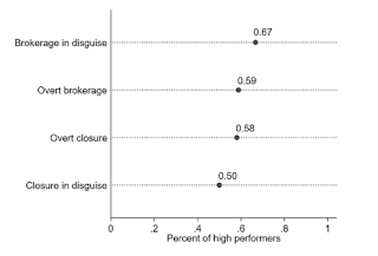 As anyone in business will testify to, personal connections matter a lot for success. They are the source of information and ideas, they can be used to draw in resources and capabilities, and they give rise to yet more connections. The naïve version of this narrative is that more connections are always better, but we know that’s not true. Personal connections are maintained through attention and care, so having too many means neglecting many. Instead, what matters most is to be connected to people who are not connected to each other: to be a broker of personal ties. The network of a broker is the most efficient one for drawing in novel, timely, and helpful information, among other things. Except that being a broker is not a fail-safe path to success – we know it often does not work. Explaining when it works, and when it does not, was the goal of research done by Alessandro Iorio and published in Administrative Science Quarterly. His idea was simple and novel. Maybe I will see brokers as slightly suspicious characters because they know so many people I don’t know? Maybe as a result, I will hold back the information, resources, and network ties that I would otherwise provide to my contacts who I do not see as being brokers? Making this simple idea especially neat is that I may not be right about who is a broker and who is not. Accordingly, being a broker who is not perceived as a broker is great; such brokers in disguise get all the benefits. Not being a broker but being perceived as one is a disaster; their personal connections have a poor structure and are poorly fed with information. Iorio went ahead and tested this idea by getting data from a consulting firm and by doing experiments. The conclusion? Consultants who were brokers in disguise were clear winners in the ratings for being top innovation performers; two-thirds of them achieved this rank. Meanwhile, being a broker while being perceived as one was no better than not being a broker and not being perceived as one either. Brokerage works when it is hidden; not otherwise. Why is that? When gauging the effect of trustworthiness of each person, it became clear that being thought of as a broker meant being seen as less trustworthy. This explained brokers’ inability to take advantage of having better personal connections than other consultants. What does this mean for how we deal with personal connections in our career and life? Turning this evidence into advice is complicated. The benign version would be that modesty is a virtue, because dropping names of people others do not know places you at a disadvantage whether or not you really know them. The less benign version is that the successful user of personal networks is fundamentally dishonest because this person gives the impression of having a different network of contacts than the actual one. Of course, we should not be too surprised by this kind of problem. The behaviors that evidence shows to be effective when managing other people are not always the most admirable ones. Iorio, Alessandro. 2022. Brokers in Disguise: The Joint Effect of Actual Brokerage andSocially Perceived Brokerage on Network Advantage. Administrative Science Quarterly, forthcoming. Comments are closed.
|
Blog's objectiveThis blog is devoted to discussions of how events in the news illustrate organizational research and can be explained by organizational theory. It is only updated when I have time to spare. Archives
May 2024
Categories |
 RSS Feed
RSS Feed